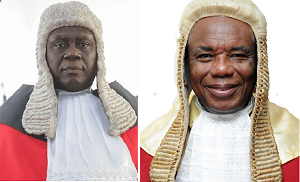
Retiring in their prime
When the judiciary begins its next legal year in October 2023, two of Ghana’s Supreme Court Justices would have retired from the bench at just 70 years old.
Intellectually and experientially, these two Justices, like many retired Supreme Court Justices before them, would be retiring in their prime.
Chief Justice Kwasi Anin Yeboah and associate Justice Jones Victor Mawulorm Dotse both retire this summer.
Both are retiring at a time Ghana could benefit invaluably from their decades of learning and experience, first, at the bar and, later, on the bench.
In the past, Ghana has witnessed great Chief Justices and great Associate Justices step down from the bench because Article 145(2)a of the 1992 Constitution says they should do so when they turn 70.
At the time of retiring, many of these Chief Justices and Associate Justices are really in their prime and better placed to serve our dear nation and its judiciary with valuable knowledge and uncommon experience accumulated over the decades.
A justice of the Supreme Court is not an ordinary citizen. Often, she acquires her knowledge, skills and experience after years and years of learning and practising at the bar and, often for many of them, after further years on courts beneath the Supreme Court.
Unlike most professions thus, a Justice of the Supreme Court comes of age and attains the prime of her profession very late in years. Sadly, in Ghana, this is when she is constitutionally mandated to retire.
Age
I am ideologically against tempering with a reasonable and “workable” constitution such as the 1992 Constitution. But it appears reconsidering the age at which our Supreme Court Justices retire might be necessary.
At 70, admittedly, a person is less physically robust. The duties of Justices of the Supreme Court, however, require the use of the mind, not the brute exertion of muscles.
Theirs is a supreme task that employs wisdom, measured speech, sound judgment and sound pragmatism, traits that catalyst the nation’s development efforts.
Such cultivated mental maturity and dexterity, it has been scientifically demonstrated, turns to decline when most people turn 80.
At 70 also, Supreme Court Justices are the living tradition of the nation’s legal culture and values and aspirations.
New and younger members of the bar and the bench look up to them for guidance in legal knowledge, legal ethics and much more.
The nation expects them to expertly bend the arch of its development endeavours towards the most cherished values and aspirations of the 1992 Constitution.
There is a good reason why one of the oldest institutions in history, the Roman Catholic Church, canonically mandates its bishops or archbishops to offer their resignation to the pope at age 75.
When tendered, the pope is at liberty to accept or decline the offer to resign from office as bishop or archbishop. The pope himself, under canon law, holds his office for life.
On the bench, especially the apex bench, old age is a virtue, not a liability.
At 70, our Supreme Court Justices often gain valuable experience and knowledge and are well-poised to serve to the nation wisely and pragmatically.
Sadly, this is the age the Constitution mandates them to deliver their valedictory judgment, draw the curtain, and take their final bow from the bench.
It is a little consoling that after retiring in their prime, our constitutional arrangement allows Justices to serve our nation in strategic ways in education, governance and security.
But still, the nation would gain more if they served for at least another decade on the bench.
An encomium
Mr Kwasi Anin Yeboah has done so well as Chief Justice. Among so many commendable achievements, he fronted the expansion of the frontiers of justice in Ghana through the erection of courthouses and court complexes as well as residential facilities for magistrates and judges.
In the last months of his tenure, each week met with Mr Anin Yeboah commissioning a court complex or a residential facility for judicial persons.
The list is long and includes the commissioning of a courthouse complex in Boamang in the Afigya Kwabre North District in the Ashanti Region; the commissioning of two court premises in Gomoa Central and Agona East in the Central Region; the commissioning of an ultra-modern courthouse at Asesewa in the Eastern Region; the commissioning of a modern circuit court at Kyekyewere/Nsuaem at Assin South in the Central Region; and the commissioning of the Gbese District Court at Ayalolo in Accra.
The long list also includes the commissioning of the new High Court in Dambai in the Oti Region and the High Court at Gbetsile in the Kpone Katamanso Municipality.
These facilities, part of the government’s plan to build 120 courts and 150 bungalows, are modernised with solar panels, standby power plants and boreholes.
The retiring Chief Justice did well in collaborating with the government, local assemblies and traditional authorities to put facilities that would undoubtedly contribute to the speedy delivery of justice in Ghana.
Thanks for your service and Godspeed.
The writer is an international Rule of Law for Development attorney. E-mail:
